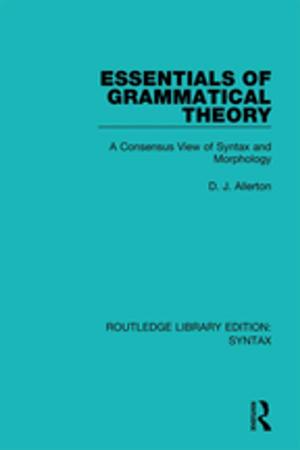Revival: Thought and Reality - Hegelianism and Advaita (1937)
Nonfiction, Religion & Spirituality, Philosophy| Author: | Poolla Tirupati Raju | ISBN: | 9781351242837 |
| Publisher: | Taylor and Francis | Publication: | July 27, 2018 |
| Imprint: | Routledge | Language: | English |
| Author: | Poolla Tirupati Raju |
| ISBN: | 9781351242837 |
| Publisher: | Taylor and Francis |
| Publication: | July 27, 2018 |
| Imprint: | Routledge |
| Language: | English |
This work is a contribution to certain aspects of idealistic philosophy. It is a comparative study, yet it is not a comparison for the sake of comparison.
This book examines the supra-rational Absolutism of the West developed under the Hegelian influence, and in the light of the criticisms shows the peculiar character of the Advaita Vedanta of Sankara. It is therefore not a mere exposition, but a criticism and construction. The discussions are not cosmological, but epistemological and metaphysical, approached from the side of logic.
The work may also be viewed as a reorientation of Sankara's system. It places Sankara’s philosophy in line with the idealistic philosophies of the West, so that we can understand the peculiarities of the former in terms of the latter. It thus discovers or brings into clearer light the guiding principle of Sankara’s thought. It brings out the full significance of the principles of non-contradiction applied by Sankara as a test of truth and reality, and shows its difference from the same principle as understood by Hegel and the Hegelians. The aim of this work is to attempt at laying the metaphysical foundation of the logic of supra-rational Absolutism, the interpretation of Advaita is based mostly on polemical works.
This work is a contribution to certain aspects of idealistic philosophy. It is a comparative study, yet it is not a comparison for the sake of comparison.
This book examines the supra-rational Absolutism of the West developed under the Hegelian influence, and in the light of the criticisms shows the peculiar character of the Advaita Vedanta of Sankara. It is therefore not a mere exposition, but a criticism and construction. The discussions are not cosmological, but epistemological and metaphysical, approached from the side of logic.
The work may also be viewed as a reorientation of Sankara's system. It places Sankara’s philosophy in line with the idealistic philosophies of the West, so that we can understand the peculiarities of the former in terms of the latter. It thus discovers or brings into clearer light the guiding principle of Sankara’s thought. It brings out the full significance of the principles of non-contradiction applied by Sankara as a test of truth and reality, and shows its difference from the same principle as understood by Hegel and the Hegelians. The aim of this work is to attempt at laying the metaphysical foundation of the logic of supra-rational Absolutism, the interpretation of Advaita is based mostly on polemical works.















